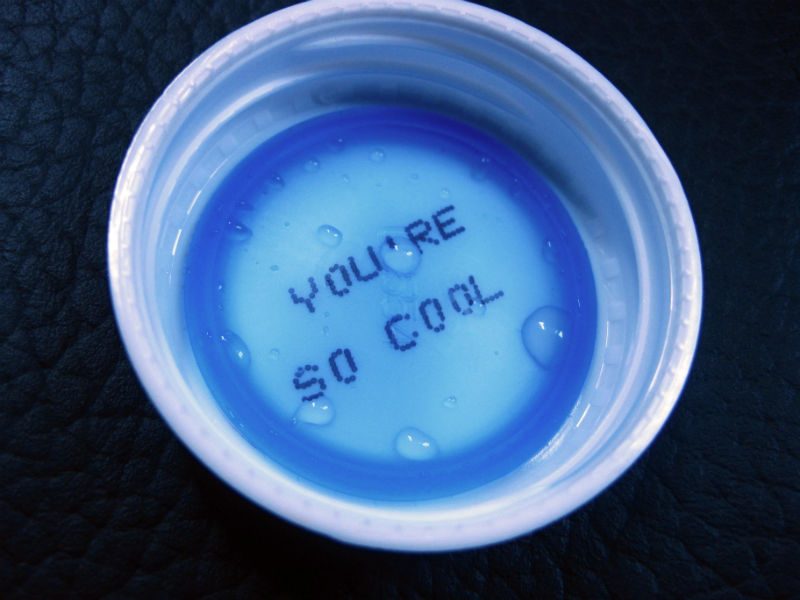Keeping Wet…Inside
It’s not secret to those who know me well: I am not a fan of drinking water. It’s not that I have some long-simmering grudge against water exactly but rather that I have a long-time love affair with a certain bright green diet soda. Having a six pack of aforementioned bright green diet soda in my dressing room (whatever that looks like) is actually in my comedy rider. It’s the only thing in my comedy rider.
So when do I have time to drink water? I’ve always got a can of bright green diet soda in my hand. It’s not a habit my friends or family like very much. In fact, when my last partner was very very sick I gave up drinking bright green diet soda at her request. Although I resumed drinking it when she died, partly to get back at her for dying and partly because I really like it.
But when summer comes and all the queers are running all around doing All The Queer Things But Outside, it’s hard not to think about hydration and why it’s important and how to make it work. I talked to Deb Malkin who is a Certified Massage Therapist and the owner of Radical Being Bodywork in the Bay Area. She is also a self-identified “hydration nerd” which I admit is a little bit scary to me because I keep imagining Hydrocon and the kind of costumes that would result.
So, why is hydration important? In the short term? In the long term? Why does it matter?
Our bodies are made up of 60% water. Water– with the right mix of electrolytes– is what allows the functioning of all our basic needs, like our blood moving through the body delivering vital nutrients, or for our kidneys and lymph system to filter out waste products or for our muscles to receive oxygen. Low hydration can affect every part of our body from brain function, to pain and inflammation to waste management.
I have a friend who has been waking up with headaches for years, and just realized that she was dehydrated. She started drinking more water at night as well as when she woke up in the morning and her morning headaches have disappeared. It only took a few days for a problem she had for years to be abated.
I’ve seen clients get rid of their chronic nighttime leg cramps with the right hydration. No more leg cramps, means better sleep, and better sleep means a reduction in pain and a greater sense of well-being. In the long term, I believe good hydration can mean a better functioning body and a decrease in chronic pain.
So, what are some hydration urban legends. Well, maybe that’s overstating it. What are some hydration myths that aren’t based on facts?
Drinking 8 glasses a day used to be the golden rule. That number has changed and it’s actually higher. I’ve seen everything from drink half your body weight in ounces, or the new Institute of Medicine guidelines which recommends that women consume approximately 2.7 litres (91 ounces) of total water — from all beverages and foods — each day, and men an average of approximately 3.7 litres (125 ounces daily) of total water. Total water includes the water in what we drink and eat.
Another myth is that there’s no such thing as too much water, there is! Too much water can cause symptomatic hyponatremia, a condition where the sodium levels in the blood become dangerously low. Hyponatremia is fairly rare and has mostly been seen in long distance runners, but it can happen to anyone.
Hydration is not just about the volume of water but more importantly it’s about the mix of water and minerals that will allow the water to permeate the cell wall and be of use. Just consuming more water only to pee it out does the body little good. Ensuring that you have the right balance of water, calcium, chloride, potassium, magnesium, and sodium is more important than volume.
What is the best way, or some good ways, to stay hydrated in the summer, especially for folks who might be working outside, playing softball outside, etc? Or in my case, standing on the West 4th Street subway platform.
If you’re exercising or sweating on a subway platform, don’t wait until you’re thirsty to drink water. Also sports drinks or electrolyte supplement like Electromix made by Emergen-C, or Nuun will help deliver the right balance of water and minerals. Just pure water when you’re working out longer than two hours will not replace what you’re losing. Drink water before, after and during your workout or your day in the sun. It’s easy to make your own sports drink, by watering down some 100% fruit juice (adding a cup or two of water to a cup of juice) and then dropping in a teaspoon of sugar or honey, and then adding a pinch of salt.
Did you just give instructions on how to make your own sports drink? Wow.
And, at least 20% of your water volume comes from food, so eat lots of water rich foods such as watermelon, lettuce, grapefruit, cucumber, yogurt, berries and tomatoes. I recommend curtailing the caffeine during the hot months and when you’re exercising. Caffeine is a diuretic, and while coffee or tea counts towards your volume intake, it’s also going to make you pee faster than your cells have time to extract the water it needs to function. So the more caffeine you drink, the more water and foods you need to replace those fluids, so best to not get started on that loop.
In general, your pee is a great indicator of your level of hydration on a daily basis. You’re shooting for a light yellow color. If your pee is dark yellow or orange or has a strong scent, then you need to increase your water intake.
